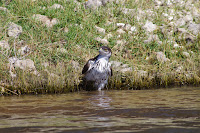
The Chobe River system is as complex and diverse as it is beautiful, and understanding the manner in which adjacent human populations affect this crucial regional artery is of the utmost importance for conservation, community health and sustainability. As part of Dr Kathleen Alexander's ongoing Coupled Human-Natural Systems project (conducted through a partnership between CARACAL and Virginia Tech and funded by the NSF), the Chobe River is regularly sampled by her team. These are some images captured during this week's sampling, during which the team collected data at 28 points along the river.

A number of issues are at play here. Perhaps most crucial is the role played by antibiotic resistance. Dr Alexander recently published a paper on this issue (we posted a link to it here), and this has since been the subject of a number of articles (most recently on SciDev.Net and AChangingWorld ). The current water quality analysis follows on from the previous study by tracking antibiotic resistance in E-coli present in the river system, and samples are taken at each of the sample sites specifically to test for the presence of resistant colonies.

Of course this cannot be assessed in isolation - we also need to understand the manner in which the river flows and a whole host of other variables which might affect the presence and abundance of these bacteria in the water-column, including the presence of sediments, river-traffic, effluent drainage points, seasonal variation in water-levels, annual flood-surges, variations in temperature, and many more.
In effect, then, this study is about much more than just antibiotic resistance. This, certainly, is one of the most important research outcomes, but this study also aims to measure the overall health of the Chobe River System and -by extension - all the people and ecosystems dependent upon it.









No comments:
Post a Comment